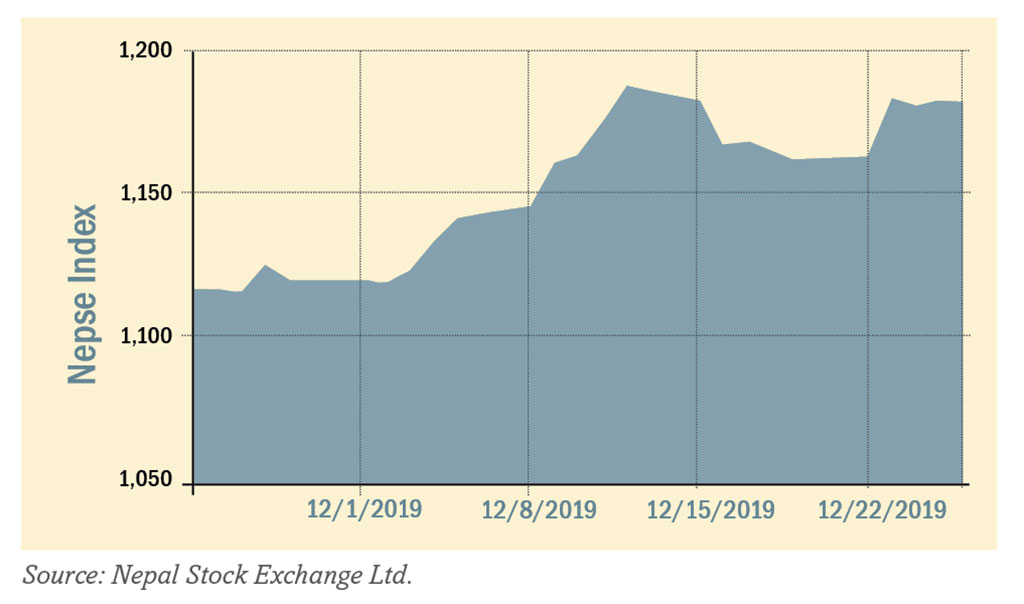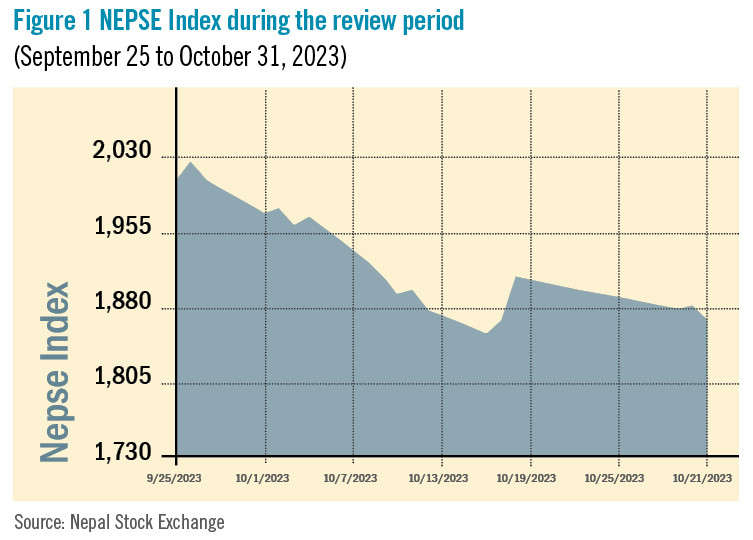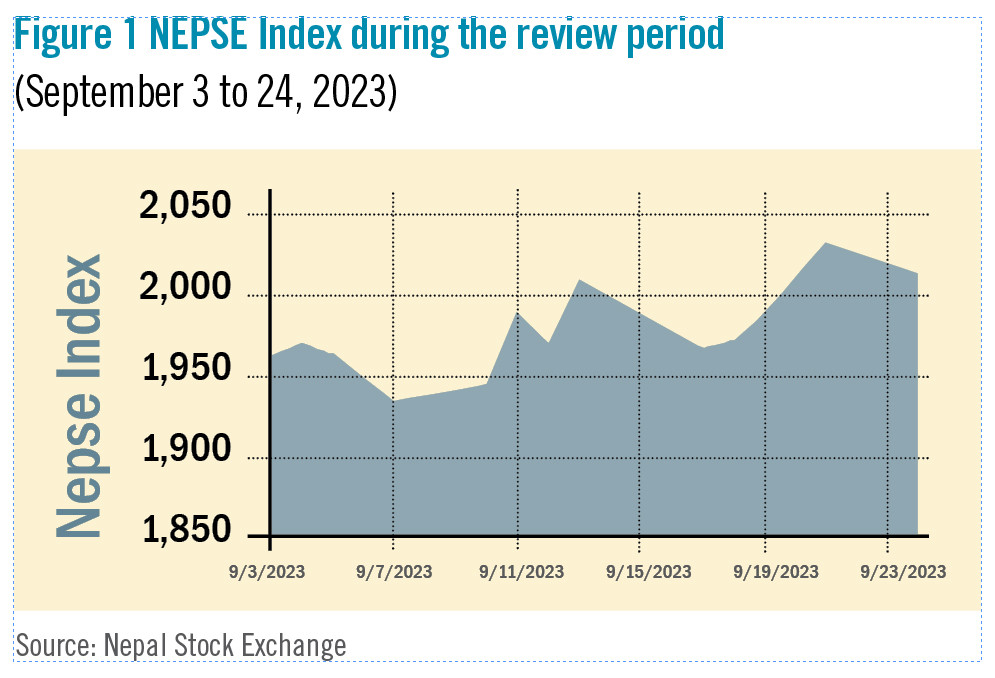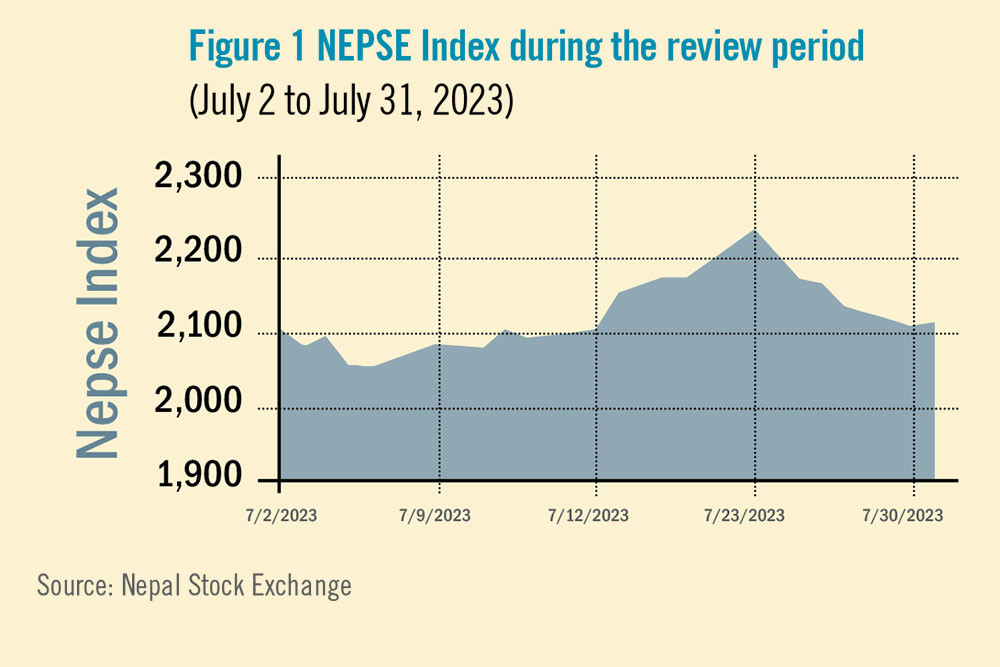
During the review period of January 23 to February 24, the Nepal Stock Exchange (NEPSE) index plunged by 66.51 points (-5.69%) and closed at 1,102.32 points. The market was mostly on a freefall spree and dropped to a three-year low of 1,112.87 points on February 14. Moreover, as investor confidence remained low, the total trading volume during the period decreased substantially by 44% and stood at Rs 5.26 billion.
 During the review period, all the sub-indices landed in the red zone. The Hydropower sub-index (-10.12%) led the pack of losers with decrease in share value of Upper Tamakoshi (-Rs 38), Arun Kabeli (-Rs 33) and Chilime Hydropower (-Rs 31). Similarly, Life Insurance sub-index (-9.9%) was second in line with slump in share values of Life Insurance Co (-Rs 203), Nepal Life Insurance (-Rs 105) and Gurans Life Insurance (-Rs 48). Likewise, Others sub-index (-6.45%) followed suit with the fall in share value of Citizen Investment Trust (-Rs 54) and Nepal Telecom (-Rs 51). Non-Life Insurance sub-index (-5.97%) went down with decrease in the share value of Rastriya Beema (-Rs 320) and Nepal Insurance (-Rs 204). This was followed by Commercial Bank sub-index (-5.34%); top losers in this sub-index were Standard Chartered Bank (-Rs 48) and Nabil Bank (-Rs 47).
During the review period, all the sub-indices landed in the red zone. The Hydropower sub-index (-10.12%) led the pack of losers with decrease in share value of Upper Tamakoshi (-Rs 38), Arun Kabeli (-Rs 33) and Chilime Hydropower (-Rs 31). Similarly, Life Insurance sub-index (-9.9%) was second in line with slump in share values of Life Insurance Co (-Rs 203), Nepal Life Insurance (-Rs 105) and Gurans Life Insurance (-Rs 48). Likewise, Others sub-index (-6.45%) followed suit with the fall in share value of Citizen Investment Trust (-Rs 54) and Nepal Telecom (-Rs 51). Non-Life Insurance sub-index (-5.97%) went down with decrease in the share value of Rastriya Beema (-Rs 320) and Nepal Insurance (-Rs 204). This was followed by Commercial Bank sub-index (-5.34%); top losers in this sub-index were Standard Chartered Bank (-Rs 48) and Nabil Bank (-Rs 47).
Likewise, Manufacturing & Processing sub-index (-4.58%) lost value with decline in share value of Unilever Nepal (-Rs 1,488) and Himalayan Distillery (-Rs 29). Similarly, Microfinance sub-index (-3.57%) went down with depletion in share value of Unnati Microfinance (-Rs 629) and Mero Microfinance (-Rs 540). Finance sub-index (-3.16%) went down with decrease in share value of Hathway Finance (-Rs 13) and Gurkha Finance (-Rs 8). Also, Development Bank sub-index (-2.65%) went down with the decrease in share value of Miteri Development Bank (-Rs 22) and Bhargav Development Bank (-Rs 16). Hotels sub-index (-1.80%) followed suit with decrease in share value of Oriental Hotel (-Rs 26) and Taragaon Regency (-Rs 8).
News & Highlights
Securities Board of Nepal (SEBON) has allowed stockbrokers to engage in margin lending by providing loans to their clients to buy shares. For margin trading, investors need to have a margin account with the brokerage firm. As per Nepal Rastra Bank (NRB), stockbrokers can themselves fix the interest rate on such margin accounts. Allowing stockbrokers to engage in margin lending was one of the recommendations made by a finance ministry panel formed to address the problems in the stock market.
Nepal Stock Exchange (NEPSE) rolled back from making Personal Account Number (PAN) mandatory for share investors for stock trading. As per NEPSE, the PAN requirement will be implemented only after carrying out necessary study, although SEBON had instructed it to enforce PAN requirement in the stock market from April 14. Finance Minister, while presenting the government’s policies and programmes for the current fiscal year, had mentioned that the PAN provision would be mandatory for stock trading from this fiscal year onwards.
 On the public issue front, Shivam Cement, Universal Power Company and Asha Microfinance issued Initial Public Offerings (IPOs) worth Rs 1.35 billion, Rs 966.16 million and Rs 67.4 million respectively. Meanwhile, SEBON has approved IPOs worth Rs 353.4 million, Rs 181.6 million, Rs 148.5 million and Rs 26.96 million of Union Hydropower, Mountain Hydro Nepal, Himalaya Urja Bikas and Sparsha Microfinance respectively. The issues of Mountain Hydro Nepal and Himalayan Urja Bikas have been assigned IPO Grade 4 indicating below average fundamentals while the issue of Union Hydropower has been assigned IPO Grade 5 indicating poor fundamentals, by ICRA Nepal.
On the public issue front, Shivam Cement, Universal Power Company and Asha Microfinance issued Initial Public Offerings (IPOs) worth Rs 1.35 billion, Rs 966.16 million and Rs 67.4 million respectively. Meanwhile, SEBON has approved IPOs worth Rs 353.4 million, Rs 181.6 million, Rs 148.5 million and Rs 26.96 million of Union Hydropower, Mountain Hydro Nepal, Himalaya Urja Bikas and Sparsha Microfinance respectively. The issues of Mountain Hydro Nepal and Himalayan Urja Bikas have been assigned IPO Grade 4 indicating below average fundamentals while the issue of Union Hydropower has been assigned IPO Grade 5 indicating poor fundamentals, by ICRA Nepal.
Outlook
The mid-term monetary policy review for the current fiscal year 2018/19 is intended to provide some respite to the borrower by limiting the spread rate to 4.5% and changing bank’s cost of fund calculation methodology. However, bankers are skeptical about the proposed changes as it is likely to have a direct impact on bank operations and annual profitability. Since the secondary market is dominated by the stocks of financial institutions, amidst low investor confidence, the market is likely to be affected further in the days ahead.
This is an analysis from beed management pvt. ltd. No expressed or implied warrant is made for usefulness or completeness of this information and no liability will be accepted for consequences of actions taken on the basis of this analysis.





